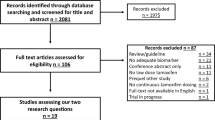Summary
In order to establish the optimal dose of tamoxifen in the treatment of advanced breast cancer in postmenopausal women, a randomized trial comparing 90 mg daily with the currently recommended dose of 30 mg daily was conducted. Sixty-eight patients were treated with the high dose and 75 patients with the low dose. The rate of response was 36 and 37% (p = 0.74), respectively. The time to response, duration of response, and the time to treatment failure were also identical at the two dose levels. Only a few side effects were observed, and they were equally distributed among the two treatment groups. It is concluded that a 30 mg daily dose of tamoxifen seems to be as effective as 90 mg.
Similar content being viewed by others
References
Ingle JN, Ahmann DL, Green SJ, Edmonson JH, Bisel HF, Kvols LK, Nichols WC, Creagan ET, Hahn RB, Rubin J, Frytak S: Randomized clinical trial of diethylstilbestrol versus tamoxifen in postmenopausal women with advanced breast cancer. N Engl J Med 304: 16–21, 1981.
Mattsson W: A phase III trial of treatment with tamoxifen versus treatment with high dose medroxyprogesteroneacetate in advanced postmenopausal breast cancer.In S Iacobelli and A Di Marco (eds). Role of Medroxyprogesterone in Endocrine-Related Tumours. Progress in Cancer Research and Therapy, Vol 15. Raven Press, New York, 1980, pp 65–71.
Westerberg H: Tamoxifen and fluoxymesterone in advanced breast cancer: a controlled clinical trial. Cancer Treat Rep 64: 117–121, 1980.
Smith IE, Harris AL, Morgan M, Ford HT, Gazet J-C, Harmer CL, White H, Parsons CA, Villardo A, Walsh G, McKinna JA: Tamoxifen versus aminoglutethimide in advanced breast carcinoma: a randomized cross-over trial. Br Med J 283: 1432–1434, 1981.
Patterson JS: ‘Nolvadex’ (tamoxifen) as an anti-cancer agent in humans.In RL Sutherland and VC Jordan (eds). Non-steroidal Antiestrogens. Molecular Pharmacology and Antitumour Activity. Academic Press Australia, 1981, pp 453–472.
Ward HWC: Anti-oestrogen therapy for breast cancer: a trial of tamoxifen at two dose levels. Br Med J 1: 13–14, 1973.
Fabian C, Sternson L, El-Serafi M, Cain L, Hearne E: Clinical pharmacology of tamoxifen in patients with breast cancer: correlation with clinical data. Cancer 48: 876–882, 1981.
Manni A, Arafah BM: Tamoxifen-induced remission in breast cancer by escalating the dose to 40 mg daily after progression on 20 mg daily: a case report and review of the literature. Cancer 48: 873–875, 1981.
Stewart JF, Minton MJ, Rubens RD: Trial of tamoxifen at a dose of 40 mg daily after disease progression during tamoxifen therapy at a dose of 20 mg daily. Cancer Treat Rep 66: 1445–1446, 1982.
Westerberg H, Nordenskjöld B, Schryver A, Notter G: Anti-oestrogen therapy of advanced mammary carcinoma. Acta Radiol Ther Phys Biol 15: 513–518, 1976.
Hayward JL, Carbone PP, Heuson J-C, Komaoka S, Segalof FA, Rubens RD: Assessment of response to therapy in advanced breast cancer. Eur J Cancer 13: 89–94, 1977.
EORTC Breast Co-operative Group: Revision of standards for the assessment of hormone receptors in human breast cancer: report of the second EORTC workshop. Eur J Cancer 16: 1513–1515, 1980.
Wulff HR: Confidence limits in evaluating controlled therapeutic trials. Lancet 2: 969, 1973.
Lerner HJ, Band PR, Israel L, Leung BS: Phase II study of tamoxifen: report of 74 patients with stage IV breast cancer. Cancer Treat Rep 60: 1431–1435, 1976.
Tormey DC, Lippman MF, Edwards BE, Cassidy J: Evaluation of tamoxifen doses with and without fluoxymesterone in advanced breast cancer (in preparation).
Furr BJ, Patterson JS, Richardson DN, Slater SR, Wakeling AE: Tamoxifen.In ME Goldberg (ed). Pharmacological and Biochemical Properties of Drug Substances, Vol 2. A.P.A., Washington, 1981, pp 355–399.
Katzenellenbogen BS: Basic mechanisms of antiestrogen action.In WL McGuire (ed). Hormones, Receptors, and Breast Cancer. Progress in Cancer Research and Therapy, Vol 10. Raven Press, New York, 1978, pp 135–157.
Sutherland RL, Murphy LC: The binding of tamoxifen to human mammary carcinoma cytosol. Eur J Cancer 46: 1141–1148, 1980.
Carter AC, Sedransk N, Kelley RM, Ansfield FJ, Ravdin RG, Talley RW, Potter NR: Diethylstilbestrol: recommended dosages for different categories of breast cancer patients. Report of the co-operative breast cancer group. JAMA 237: 2079–2085, 1977.
Løber J, Rose C, Salimtschik M, Mouridsen HT: Treatment of advanced breast cancer with progestins — a review. Acta Obstet Gynecol Scand, Suppl 101: 39–46, 1981.
Author information
Authors and Affiliations
Rights and permissions
About this article
Cite this article
Rose, C., Theilade, K., Boesen, E. et al. Treatment of advanced breast cancer with tamoxifen: Evaluation of the dose-response relationship at two dose levels. Breast Cancer Res Tr 2, 395–400 (1982). https://doi.org/10.1007/BF01805882
Issue Date:
DOI: https://doi.org/10.1007/BF01805882




